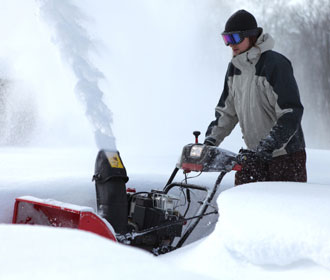Working Outside? Protect Yourself from Cold Stress
 Trench foot and chilblains may be unfamiliar, but they are real cold stress conditions that can require first aid. It doesn’t have to be freezing cold for these to occur. What is cold stress? It’s a condition that can happen to people who are exposed to extreme cold or work in cold or wet conditions. Cold weather or wet conditions can lead to a dangerous health situation, creating injuries such as hypothermia, frostbite, trench foot or chilblains. With the extreme temperatures that winter brings to our region, St. Luke’s wants to help you protect yourself from cold stress.
Trench foot and chilblains may be unfamiliar, but they are real cold stress conditions that can require first aid. It doesn’t have to be freezing cold for these to occur. What is cold stress? It’s a condition that can happen to people who are exposed to extreme cold or work in cold or wet conditions. Cold weather or wet conditions can lead to a dangerous health situation, creating injuries such as hypothermia, frostbite, trench foot or chilblains. With the extreme temperatures that winter brings to our region, St. Luke’s wants to help you protect yourself from cold stress.
The Cold Stress Equation
The factors that lead to serious cold-related illnesses and injuries can be described by the Cold Stress Equation.
OSHA (Occupational Safety and Health Administration) has a free publication that you can order or print out that defines the level of danger and what action to take if you or a coworker show symptoms of a cold stress condition.
What are trench foot and chilblains?
Chilblains happen in cool or wet conditions, damaging the small blood vessels in the skin that create ulcers or blisters. Trench foot is injury to the feet that happens after prolonged exposure to cold stress conditions.
What are frostbite and hypothermia?
Frostbite and hypothermia are more familiar conditions. If untreated, frostbite can cause severe tissue damage due to freezing in the deep layers of the skin. Hypothermia is a medical emergency that happens when someone’s body temperature falls below 95 degrees Fahrenheit.
“Other factors can also increase your risk of cold-related injuries, such as mobility impairment, or walking alone outside, falling and being unable to get up without help, and excess alcohol consumption,” said Scott Wolff, MD, St. Luke’s Emergency Services.
If you suspect anyone is suffering from cold-stress conditions, especially hypothermia, it’s important to get medical attention or call 911.
Preventing Cold Stress from Affecting You
When working outdoors, pay attention to your physical condition, and the condition of the people working around you. “As in most health care issues, prevention is key,” said Dr. Wolff. “Consider having warm clothes in your car in the event of a car accident or if you get stuck in the snow.” Here are some other prevention tips:
- Wear proper clothing for the conditions
- Layer clothing to adjust for changing temperatures
- Loose clothing is better than tight, to create a layer of warm air
- Wear hat, gloves, and underwear designed to keep water away from the body
- Take frequent, short breaks in warm, dry shelters to allow the body to warm up
- Do your work during the warmest part of the day
- Work in the buddy system to watch for symptoms
- Eat warm, high-calorie foods like pasta
